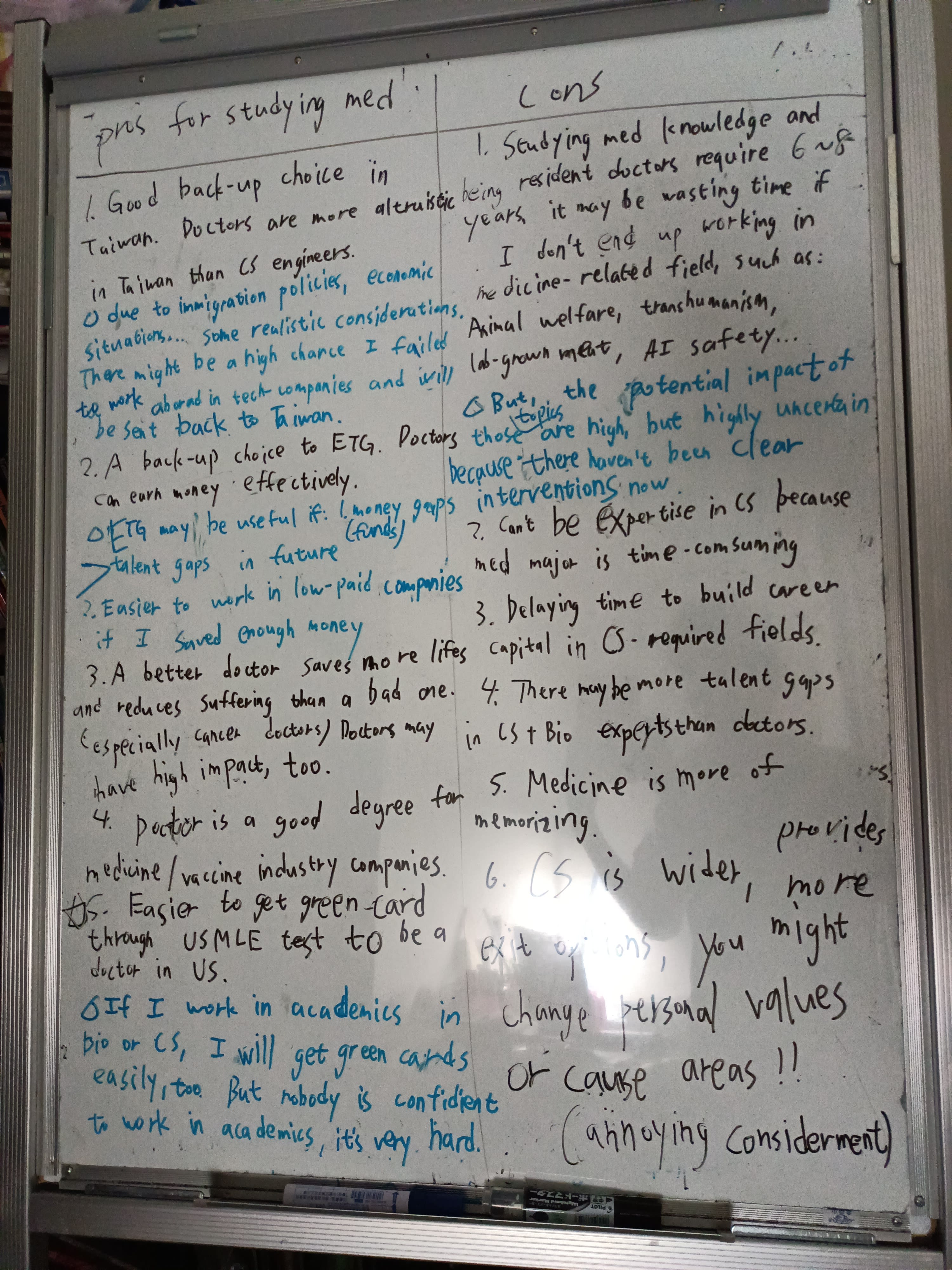Hello, I'm actually only a 17 year-old-boy living in Taiwan. Most of you would want me to focus on studying for now, but in Taiwan, we need to decide and prepare for exams for college majors. I'm considering if I should study medicine+ basic CS or a CS-specialized route plus some basic biology. My parents are doctors and scientists(working on diabetes) , they aren't familiar with EA, I need stronger arguments to convince them, too. Also, med is the most competitive major in Taiwan.
First, I need to claim my cause area priortization view(for now, may change in the future): I think animal welfare(especially wildlife)>global health> extinction risks. S-risks of AI is important, too. But there hasn't been signs show that AI probably has sentience, so I'll consider to focus on this if it was really found that AI have sentience. I'm not a strong longtermist, also I don't think extinction is a bad thing for future humanity(sorry if you feel disrespect). I think I'm more fit on researching rather than advocating. Also, I think my talent for CS and medicine is the same now. In my opinion, the most impactful career I choose now is bioinformatics researcher in academics or industry.
The picture below is the main pros and cons of studying medicine(I wrote it as neatly as I can). In sum, medicine is a better job in Taiwan because Taiwan is a small-market country, and CS engineers in Taiwan can only ETG(earn to give), it's hard to get works on EA-aligned topics in Taiwan for CS engineers. The best way to have positive impacts is moving abroad to America, I plan to have a master or even PhD degree there, but it's still hard because of immigration visa policy(I need to go back Taiwan if I'm fired and losing jobs for 2 months, tech-jobs are not stable, easily to get fired)and my bad socializing skills.

I hope you to look at my pros and cons list carefully , and criticize&correct about this. I definetely agree that CS is more likely to be useful than biology, not to mention medicine. EAs choose CS majors more. CS gives you a wider career path. The most important questions are: 1.Can you really easily change your companies with CS? Likewise, if we work in BioNTech as an engineer for bioinformatics, can you switch to Google/Facebook(Meta)/Open AI easily? I think you need to be different specalitists even if you work as a software enginner in different companies. I suspect that it's easy to change career routes to a totally different cause area only by your CS and math skills.
2.How do our cause priortization changes by time? In 1960, global health, animal welfare, nuclear, biorisks have already been important cause areas. Medicine is still important now. But AI and climate risks are new cause areas. Are there any more examples that the cause areas always change fast?
Sorry, too many questions on one post, I've posted lots of questions on EA forum recently, all aimed to answer this major decision question . I've been thinking of this super hard every hours. I'm afraid I'm on the wrong way , so hope you can give me useful advices, I'll also very grateful if you'd like to discuss with me on phone, thanks!!!
Hello Ben(what if you could give 20% of your income? Would it be double more impactful)
1.Thanks for answering, there are fewer people in EA working at biology field.
2.ETG is really somethink we can conisder about, according to Toby Ord's podcasts on 80000 hours, he said talent gaps are much needed instead of funding gaps, most EA comapnies would rather get a great worker rather than getting $100000 donation,(but things like animal welfare may be different, its funding gaps are bigger). You should also consider careers like biology professor, if you're a go... (read more)